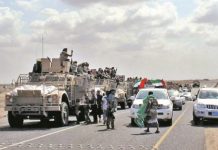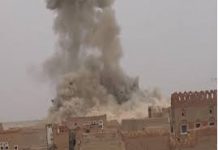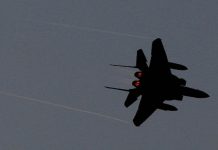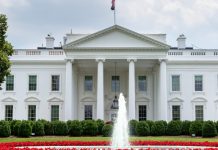Yemen is the cemetery of invaders, or so the ancient proverb goes, and today it is certainly the burial ground of foreign military coalitions. In 2015, Saudi Arabia and the United Arab Emirates (UAE) sent their armed forces to lead a regional intervention into Yemen, thinking it would last only weeks. Why wouldn’t they? Two of the richest countries in the world, backed by the most powerful Western countries, were waging war in one of the world’s poorest nations. Their announced aim was to restore Yemen’s internationally recognized government to power after the armed Houthi movement, also known as Ansar Allah, ousted it from the capital, Sana’a, in a coup d’état.
Fast forward four years: Riyadh and Abu Dhabi, which entered the Yemeni conflict shoulder-to-shoulder, have turned on each other in a proxy war. In August, UAE-backed local groups carried out a new coup against the same Yemeni government, this time in its interim capital of Aden, while Emirati aircraft bombed Saudi-supported troops.
The Saudi leadership’s typical approach to problem-solving is to essentially throw money at something until it goes away. But no matter how many billions of dollars worth of weapons Riyadh has bought to bomb Yemen, it must be appallingly clear by now that this is akin to throwing cash off of a cliff and hoping to fill the ocean. At the heart of why this spending and bombing has been futile is the Yemeni president. Hadi is not the one making the most money from this war – far from it – but he occupies the most important decision-making post of any Yemeni. And yet, as a decision-maker, he is inept. This absence of leadership at the top was exemplified by Hadi’s silence throughout the events in August, and has been a key factor underlying almost every step of Yemen’s dissolution since 2012, when Hadi became president through an uncontested election largely arranged by Riyadh. Indeed, it was Hadi’s firing of prominent southerners from government posts that helped spur the creation of the STC in 2017. The fact that the Saudis have, for seven years now, tied their fate in Yemen to Hadi says much about Riyadh’s capacity for forethought or even learning.
In August, the Saudi narrative, as well as the legal basis for its intervention in Yemen, unraveled. United Nations Security Council (UNSC) Resolution 2216, passed in April 2015, highlighted the Yemeni government’s request that Gulf countries assist in its return to power. The Saudi- and Emirati-led coalition has claimed this document offers legal legitimacy for their military intervention in Yemen. This claim is now preposterous. The UAE is actively supporting a military front against the Yemeni government. Emirati actions may well violate Article 2(4) of the UN Charter, which prohibits the use of force in another state if it does not have that state’s consent, if there is no UNSC authorization, or it’s not in self-defense. The overarching war in Yemen has now become tripartite – the Houthis vs the Saudi-backed Yemeni government vs the UAE-backed STC – and a new UNSC resolution is badly needed to address the current reality.
Riyadh and Abu Dhabi, once big brother and little brother, have lost their fraternity in Yemen’s burial grounds. Their money did not buy a quick victory, but four years on, it is still paying to fill more Yemeni graves.



























